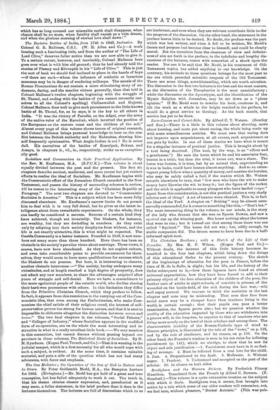The Christian Brothers ; with a Sketch of the Life
of their Founder. By Mrs. R. F. Wilson. (Began Paul and Co.)— Without doubt, the interest of this little history becomes in- tensified in the four last chapters, which bring down the doings of this educational Order to the present century. The sketch of the beginnings of education for the poor in France, before the time of M. de la Salle, is slight; but his life, and the history of the Order subsequent to it,—how these laymen have found an almost universal appreciation, how they have been forced to add to their primary object of the free education of the children of the poor, the further care of adults in night-schools, of convicts in prisons, of the wounded on the battle-field, of the sick during the late war,—will well repay perusal. We venture to think the statistics in the last chapter and note may be misleading. That men thus free from social cares may be a cheaper force than teachers living in the world, is certain enough ; that their pupils can pass a better examination, the figures prove also ; but we question whether the quality of the education imparted by those who are withdrawn into a groove will, in the long-run, be superior to that of teachers who are living more nearly on the level of their scholars and among them. The . characteristic inability of the Roman-Catholic type of mind to discern principles, is illustrated by the tale of the "vows," on p. 116, and by the rule of obedience, and its reason, on p. 133. On the other hand, the Founder's wisdom is seen in his ten rules for inflicting punishment (p. 141), which we abridge, to show that he saw its object and sole justification :-1. Punishment mast have in it no feel- ing of revenge. 2. Must be inflicted from a real love for the child. 3. Just. 4. Proportioned to the fault. 5. Moderate. 6. Without anger. 7. Prudent. 8. Understood and accepted on the part of the scholar. 10. In silence on both sides.


































 Previous page
Previous page